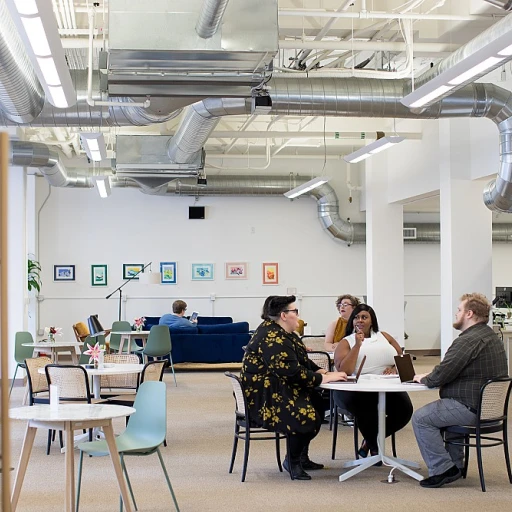
Understanding the Role of a Nursing Home Receptionist
Navigating the Frontlines of Patient Interaction
The role of a nursing home receptionist is a pivotal one in the healthcare sector, serving as the backbone of operations at the front desk. This position is not just about greeting visitors; it's an integral part of the team's day-to-day work, facilitating smooth communication between patients, team members, and healthcare professionals. A successful home receptionist must blend a variety of skills seamlessly—from basic administrative duties to more complex patient care tasks. The job entails meticulous scheduling, managing patient information, and sometimes coordinating virtual interviews or meetings. An effective receptionist resume should highlight these capabilities clearly, showcasing both hard and soft competencies that make receptionists crucial to the nursing home's functioning. For those exploring a career in this field, understanding the job description and requisite qualifications is essential. Current positions may emphasize long-term care experience and proficiency in modern healthcare management systems. Emerging from such experiences are opportunities for career growth and development, offering pathways to more advanced roles in health administration. The role also demands engagement with social media platforms, aiding in the promotion of the facility’s services and fostering community relations. Additional benefits, like tuition reimbursement, provide avenues for continuous learning, ensuring that the receptionist's skills evolve to meet the dynamic needs of a nursing home. A meticulous approach to this role acknowledges the impact of cross-cultural sensitivity in patient interaction. Receptionists often act as the first human touchpoint for new residents, making it essential to possess patience and empathy. For more insights on effectively integrating these skills and practices into your career, visit Effective Integration of Contractors Into Company Systems.Communication Skills: A Key Asset
Mastering Communication for Effective Receptionist Roles
In the dynamic environment of a nursing home, communication skills are indispensable for a receptionist. These skills are not just about answering phones or greeting visitors; they form the backbone of daily operations and patient care. A proficient home receptionist must excel in both verbal and non-verbal communication to ensure smooth interactions with team members, patients, and their families.
Effective communication is crucial for conveying important information, whether it’s updating a registered nurse about a patient’s arrival or coordinating with other team members for a virtual interview. The ability to listen actively and respond empathetically can significantly enhance the experience for everyone involved, from the front desk to the long-term care facilities.
Moreover, a receptionist's role often involves managing social media inquiries and maintaining a professional online presence. This requires a blend of written communication skills and an understanding of digital platforms, which can be a valuable addition to a receptionist resume. Highlighting these skills in a cover letter or during an interview day can set candidates apart in their current position or when seeking new opportunities.
Communication also plays a pivotal role in cultural sensitivity and patient interaction, which are essential aspects of working in a diverse environment like a nursing home. Understanding the cultural backgrounds and health needs of patients can improve care and foster a more inclusive atmosphere.
In conclusion, honing communication skills is not just beneficial but essential for a successful career as a nursing home receptionist. These skills not only enhance daily work experience but also open doors for career development and opportunities in the health care sector.
Technology and Tools: Enhancing Efficiency
Modernizing the Reception: Technology in the Nursing Home
The modernization of nursing homes has seen technology play a pivotal role in boosting the efficiency of home receptionists. This transformation caters to tasks such as managing visitor logs, scheduling appointments, and handling inquiries. By integrating digital tools, the desk at the nursing home becomes not just a point of contact but a hub of streamlined operations. Today, receptionists can utilize software designed for work management to maintain and organize patient records efficiently. This digital transition allows for quick access to information, significantly reducing wait times and improving the overall care experience. Further enhancing efficiency is the use of communication tools and virtual interviews, especially for remote meetings with health care providers or family members of patients. These technologies ensure that essential conversations happen promptly, supporting the commitment to quality patient care. Embracing new technology isn't just about software. The physical setup, or the "front desk," is pivotal too. Organizing space with tools such as a desk file organizer contributes to a more efficient and inviting environment. This encourages engagement and ensures that patient interaction remains smooth and organized. A receptionist's resume in this digital age is enhanced by showcasing proficiency in these tools and technologies. Mentioning skills such as electronic record management and virtual communication in a cover letter can showcase an individual's readiness for a modern workspace and dedication to enhancing patient care. With technology continuously evolving, home receptionists must be open to continuous learning and adapting, enhancing their skills and, ultimately, their career. Staying updated with the latest tools is integral to maintaining competitive advantage and improving the work experience within the sector.Cultural Sensitivity and Patient Interaction
The Significance of Cultural Awareness in Patient Relations
In a multicultural country like India, it's imperative for nursing home receptionists to have a heightened sense of cultural awareness and sensitivity. This aspect of their job requires more than just understanding different cultures; it demands an ability to communicate and interact effectively with patients and their family members from diverse backgrounds. Building rapport with patients is an essential skill for a home receptionist. It's vital to recognize cultural nuances and preferences to make patients feel respected and comfortable. For instance, understanding cultural customs can guide appropriate greetings and interactions, paving the way for a positive patient experience. Moreover, sensitivity towards cultural dietary restrictions or religious practices can significantly enhance the quality of care provided in long-term care facilities. A well-rounded receptionist resume often highlights this experience, showcasing the ability to seamlessly integrate cultural awareness into daily operations. This multicultural competency isn't just beneficial for patient satisfaction; it's also crucial for team cohesion. Receptionists must work hand-in-hand with registered nurses and other team members, ensuring that all care facility operations reflect cultural respect and understanding. As the role of a nursing home receptionist becomes increasingly pivotal, those in such positions might also utilize social media to learn about cultural trends and preferences, improving their communication skills in the process. This dedication to cultural sensitivity enhances their overall job description, making them key players in the holistic care of patients in Indian nursing homes. Cultural competence may be a challenging skill to master, but with continued education and experience, receptionists can effectively support their team and the community they serve. Such skills are crucial not just for their current position but also for career development opportunities in the expanding field of health care in India.Challenges Faced by Nursing Home Receptionists
Overcoming Daily Obstacles in a Dynamic Environment
Being a nursing home receptionist is a pivotal role that combines both administrative duties and compassionate care. While this role offers a diverse and rewarding experience, it also comes with its unique set of challenges that require adaptability and quick thinking.
One of the primary obstacles is managing the front desk efficiently. As the first point of contact, a receptionist must juggle multiple tasks while maintaining a welcoming atmosphere. This entails handling phone inquiries, scheduling appointments, and addressing the concerns of visitors and patients. In a busy care facility, balancing these tasks while ensuring that each interaction is positive is no easy feat.
Communication skills are critical, yet even the most adept communicator can face hurdles when dealing with sensitive matters related to health and care. Understanding and empathy are paramount, especially when dealing with residents or family members who may be experiencing stress or anxiety. Additionally, receptionists must accurately convey information between team members and residents, ensuring that details are neither lost nor misunderstood.
Technological advancements necessitate proficiency in a range of tools, from scheduling software to patient management systems. While these tools enhance efficiency, they can also pose challenges, particularly for those new to the role or less familiar with digital systems. Continuous learning and adaptability are essential to keep up with fluid technological demands.
An often overlooked aspect is cultural sensitivity. Being attuned to the diverse cultural backgrounds of residents and their families can significantly impact the quality of care and satisfaction. Sensitivity training can be advantageous, enabling receptionists to better address the varied needs and expectations of a multicultural population.
Moreover, like many front-line positions, nursing home receptionists face the pressure of immediate problem-solving and the need to maintain composure during emergencies or high-pressure situations. Experience and a supportive team can mitigate these pressures, promoting resilience and efficacy in challenging circumstances.
In the long term, these challenges can serve as valuable growth opportunities, fostering a skill set that is adaptable across the broader healthcare industry. Embracing these challenges with a proactive mindset not only refines a receptionist’s professional capabilities but also enhances their overall career trajectory and work experience in the care sector.













